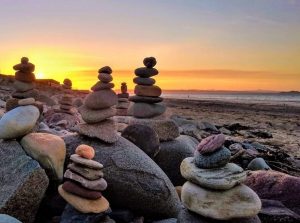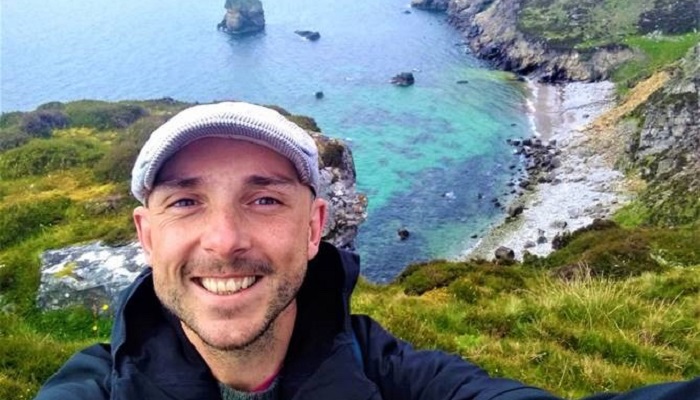Marine
Lets Talk MS
May 30, 2021 by MS Communications 1 Comment | Category Guest Blog, Marine Directorate Science
Marine Ornithologist Rich Howells blogs about his experience of living with Multiple Sclerosis for World MS Day.
Working at Marine Scotland, the acronym ‘MS’ is something I hear all the time. However, MS means something completely different for me, since I have Multiple Sclerosis.
 Scotland has one of the highest, if not the highest, prevalence of Multiple Sclerosis in the world. Multiple Sclerosis is also the most common neurological condition in young people, being generally diagnosed between the ages of 20 and 40, and is about two to three times more common in women than men. However, there’s a great deal of misunderstanding around this disease. As this is World MS Day, I’d like to use this as an opportunity to raise awareness of Multiple Sclerosis, and share my story.
Scotland has one of the highest, if not the highest, prevalence of Multiple Sclerosis in the world. Multiple Sclerosis is also the most common neurological condition in young people, being generally diagnosed between the ages of 20 and 40, and is about two to three times more common in women than men. However, there’s a great deal of misunderstanding around this disease. As this is World MS Day, I’d like to use this as an opportunity to raise awareness of Multiple Sclerosis, and share my story.
Multiple Sclerosis is a chronic neurological condition, where the body’s immune system attacks the myelin surrounding nerves (like the plastic coating on an electrical wire) in the brain and spinal cord. This damage causes scaring, or sclerosis, to the nerves, which occurs in multiple places in the body, hence the name Multiple Sclerosis. Over time this damage to nerve function (like a broken wire), results in physical and/or mental disability. MS affects everyone differently and there’s no reliable way of predicting how your disease will progress. As such, in addition to the very real physical and mental impacts of Multiple Sclerosis, the uncertainties surrounding disease progression and how to plan for and tackle this is a real challenge for people living with the condition. It is still not understood what causes Multiple Sclerosis and although there’s is no cure, there are a growing number of treatments to help slow down disease progression, with many more in development, so there’s never been a better time to have Multiple Sclerosis, so to speak!
My Multiple Sclerosis journey started in 2015 while completing fieldwork as part of my PhD studying seabird populations on the Isle of May, when I fell over, much to the amusement of my team. Unbeknown to me at the time this was the first indication of weakness in my right leg, which continues today. However, as Multiple Sclerosis is notoriously difficult to diagnose, it was several years, numerous tests, MRIs and a lumber puncture later that I was officially diagnosed, just before my wedding.

Currently I have Relapsing Remitting Multiple Sclerosis, with only slight impacts on my day to day life including: my slightly lazy ‘drop-foot’, meaning I trip often; some memory problems, I think; and trigeminal neuralgia, causing brief but agonising facial pain. However, the major obstacle I face is the unknown, which has become even more difficult during the COVID-19 pandemic, particularity due to the nature of immunosuppressant drugs. While I’m not the sort of person to worry about getting hit by a bus, my wife Lydia and I have had to consider Multiple Sclerosis in our life choices.
For example, we’ve recently bought a ground floor flat in case of any future mobility issues, have had to curtail our future travel plans, and have probably brought forward family planning by a few years. However, my diagnosis has also led to some positive changes in my life, including regular mindfulness/yoga (often on the beach), far more physical activity and new friends developed though my Multiple Sclerosis networks. While I don’t know what the future will hold for me, I do know that I now, more than ever, live every day to the max.
Living with a disability is often challenging and isolating, especially perhaps for disabilities like Multiple Sclerosis which can be hidden much of the time. While talking about these things to people with disabilities can be difficult, it’s only through greater understanding and active dialogue that we can help people through these difficulties, helping break down barriers and leading to much needed support. I hope you’ve found this a useful introduction to Multiple Sclerosis and my story, and to finish I’d like to offer a few suggestions.
If you know someone with Multiple Sclerosis:
- Avoid having preconceived ideas about what someone with Multiple Sclerosis looks like or the disability they face – everyone is different
- Get informed about Multiple Sclerosis
- Talk to people with Multiple Sclerosis to see how you can support them, or just ask how they are
For anyone recently diagnosed or living with Multiple Sclerosis:
- Remember that Multiple Sclerosis is not a death sentence, there are things you can do to slow down and manage your symptoms
- There’s plenty of support out there – reach out and get involved, it helps
- Multiple Sclerosis shouldn’t stop you doing things, you might just have to do them differently
Tags: Multiple Sclerosis, ornithology



An excellent article, well explained.